Why Suppressing Feelings Can Harm Your Mental Health
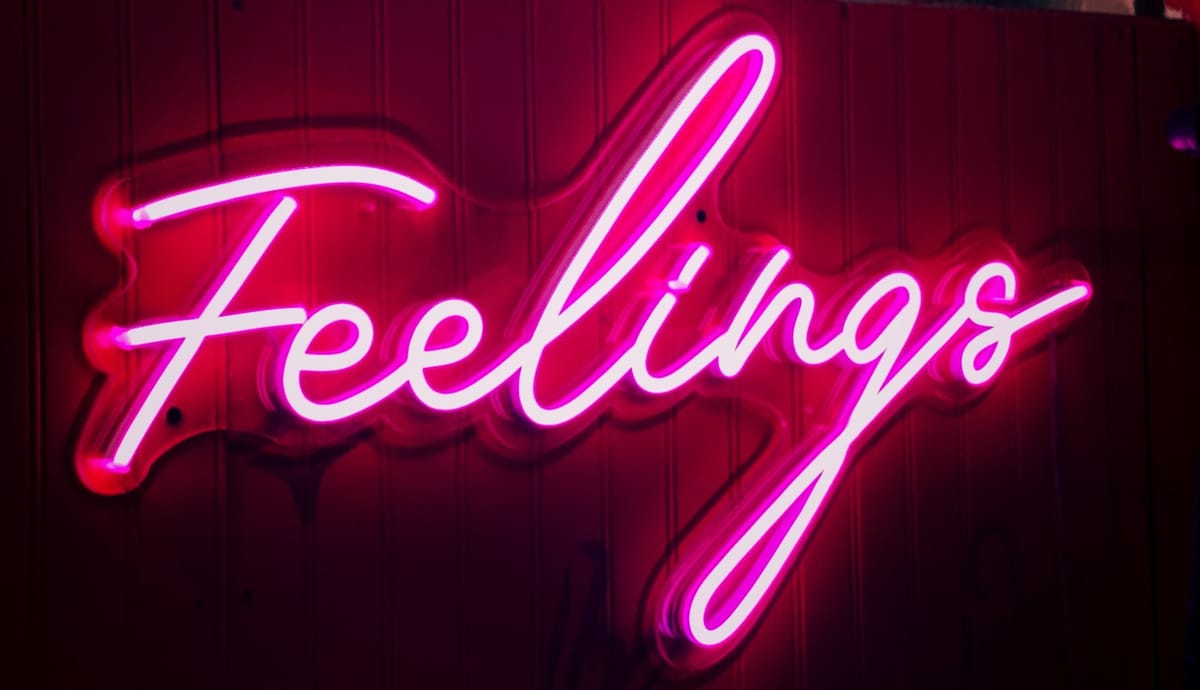
Do you avoid talking about your feelings? Do you say “I’m fine” when you’re anything but?
You might be bottling your emotions and while it may seem harmless, suppressing your feelings can quietly take a serious toll on your mental and physical health. Anxiety, depression, sleep problems, and even chronic illness have been linked to unexpressed emotions.
Therapy helps but not everyone can afford it or feels comfortable opening up to a stranger. That’s why more people are turning to AI therapy. They're private, accessible, and grounded in real therapeutic methods like CBT. And they make it easier to start talking.
In this article, we’ll break down the hidden cost of emotional suppression and how AI therapy can help you feel more in control, connected, and understood.
What Is Bottling Emotions?
Bottling emotions refers to the habit of pushing down or ignoring your true feelings instead of expressing them. While it may feel like a way to stay strong or avoid conflict, emotional suppression can backfire, often leading to greater stress, confusion, and even physical symptoms.
Here are some common signs you might be bottling emotions:
- Saying "I'm fine" when you're clearly not
- Feeling emotionally numb or disconnected
- Snapping at small things or becoming irritable
- Overthinking conversations or replaying arguments
- Trouble sleeping or unexplained fatigue
- Avoiding difficult conversations or confrontation
Many people bottle emotions out of habit, thinking it helps them “stay in control.” But research shows that unexpressed emotions don’t disappear they often intensify beneath the surface.
According to the American Psychological Association, emotional suppression is linked to increased stress levels and lower emotional well-being. When you constantly avoid your feelings, you’re essentially building emotional pressure with no release valve.
If any of this sounds familiar, you’re not broken, and you’re not alone. In the next section, we’ll explore what this habit actually does to your brain and body over time.
The Psychological and Physical Effects of Suppressed Emotions
Bottling emotions doesn’t just affect your mood, it can quietly disrupt your entire well-being. When you consistently suppress feelings like sadness, anger, or fear, your body and mind absorb the tension in ways you might not expect.
Mental Health Consequences
- Anxiety and Depression: Studies show that people who suppress emotions are more likely to experience anxiety disorders and depressive symptoms. Suppression prevents healthy emotional processing, which leads to internal buildup and rumination.
- Emotional Numbness: The more you avoid negative emotions, the harder it becomes to feel positive ones. This can lead to feeling “flat,” disconnected, or unmotivated.
- Increased Burnout Risk: Holding in frustration or stress especially at work or in relationships can lead to emotional exhaustion and burnout.
Physical Health Consequences
- Sleep Problems: Emotional tension often shows up as insomnia or poor sleep quality.
- Weakened Immune System: Chronic emotional suppression is associated with higher cortisol levels, which can impair immune function.
- Digestive and Cardiovascular Issues: Stress from bottled emotions may contribute to high blood pressure, headaches, and gastrointestinal discomfort.
According to research published in The Journal of Psychosomatic Research, people who avoid emotional expression are at a greater risk for both psychological distress and physical health problems over time.
The takeaway? Suppressing emotions doesn’t protect you, it slowly wears you down.
Next, we’ll explore why so many people develop this coping mechanism in the first place.
Why We Bottle Emotions: Fear, Shame, and Social Conditioning
If bottling emotions is so harmful, why do so many people do it often without realizing?
The answer lies in a mix of fear, learned behavior, and social messaging. From a young age, many of us are taught that expressing emotions, especially negative ones is a sign of weakness or drama. Over time, this message becomes internalized.
1. Fear of Judgment
People often stay silent about their feelings because they’re afraid of being seen as too emotional, unstable, or weak. This is especially true in environments where vulnerability is viewed as a liability like certain workplaces, families, or relationships.
2. Cultural and Gender Expectations
In many cultures, showing emotion is discouraged. For example, men are often told to "man up," while women may be labeled “too sensitive.” These unspoken rules create long-term emotional habits rooted in self-censorship.
3. Past Trauma or Emotional Neglect
If someone grew up in a home where emotions were dismissed, punished, or ignored, they may have learned to suppress them for survival. What starts as a defense mechanism can become a lifelong pattern.
4. Perfectionism and Control
For some, holding in emotions feels like staying in control. But the cost of that control is often stress, isolation, and difficulty connecting with others authentically.
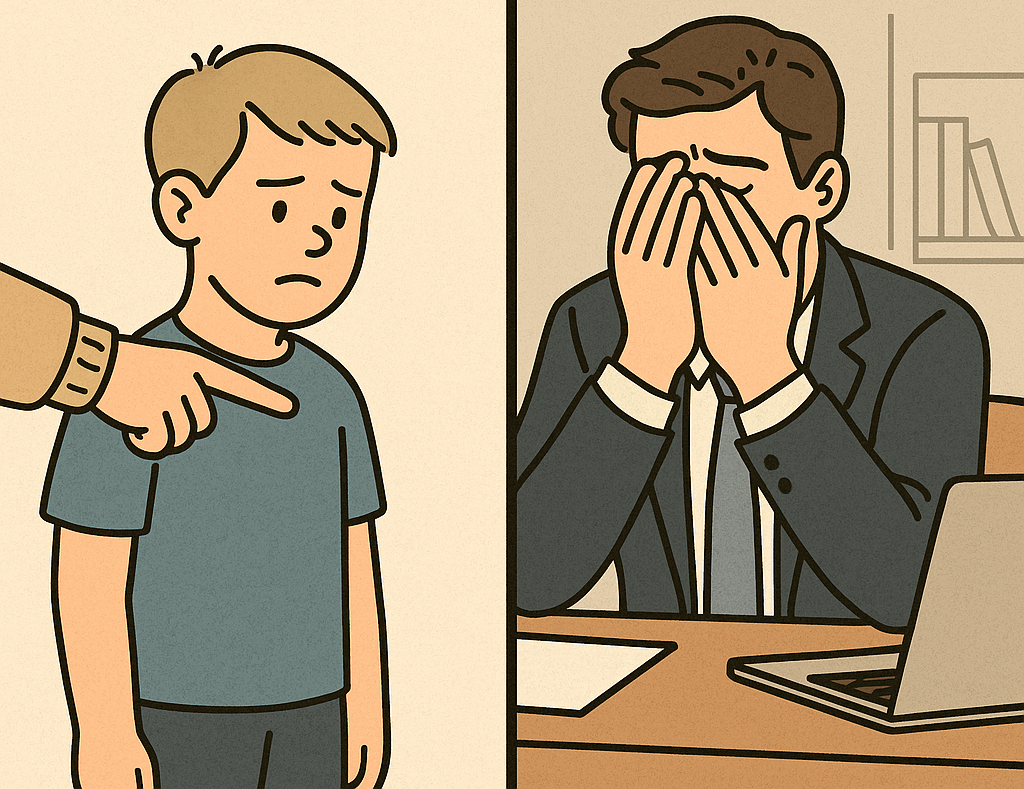
The truth is, bottling emotions isn’t a personality flaw, it’s a coping strategy. And the good news is, with the right support, it’s one you can unlearn.
Up next: what happens when we keep suppressing emotions over time and why it’s never too late to start opening up.
The Real Cost of Not Expressing Your Emotions
Suppressing emotions might seem like a way to stay in control but over time, the cost can be heavy. When you avoid expressing how you really feel, you don’t just lose emotional clarity. You risk your mental health, relationships, and even your sense of identity.
1. Disconnection from Yourself and Others
Bottling emotions creates emotional distance, not just from others, but from yourself. You might feel like you’re going through the motions, unsure of what you want or how you truly feel. This emotional numbness can lead to loneliness and low self-worth.
2. Emotional Outbursts
Ironically, the more you suppress emotions, the more likely they are to explode later, often in the form of panic attacks, angry outbursts, or breakdowns. These moments can feel confusing or shameful, but they’re often your body’s way of finally releasing built-up emotional tension.
3. Strained Relationships
When you don’t speak up about your needs, boundaries, or feelings, it’s hard for others to connect with you. Misunderstandings grow, resentment builds, and intimacy fades. Many relationships suffer not from conflict, but from silence.
4. Chronic Stress and Health Issues
Unexpressed emotions keep your nervous system in a state of low-level stress. Over time, this increases your risk for conditions like high blood pressure, weakened immunity, and digestive issues.
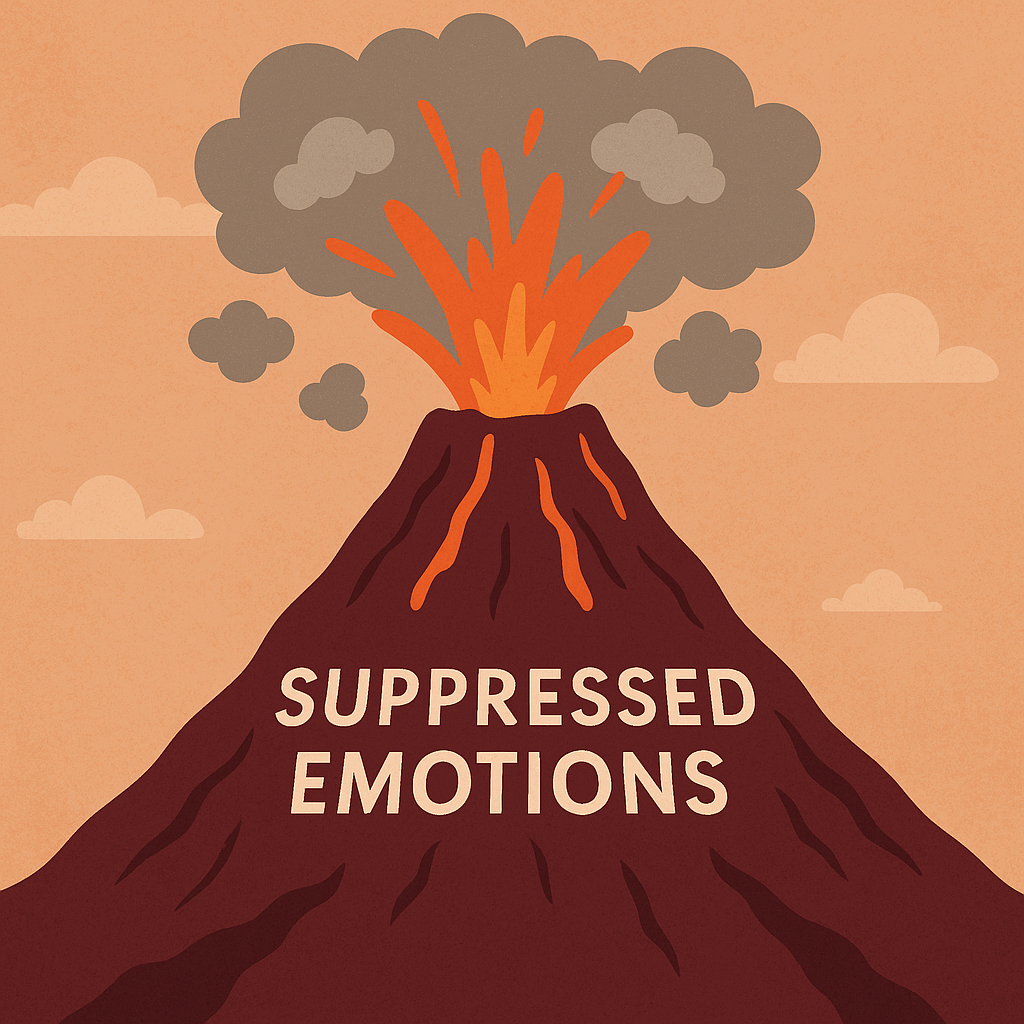
🧠 Quick Fact: According to the University of Texas, people who regularly suppress their emotions have lower immune system functioning, making them more prone to illness.
You don’t have to wait for a breakdown to start expressing how you feel. In the next section, we’ll explore why traditional therapy can help but isn’t always accessible and how AI therapy steps in as a powerful alternative.
Why Traditional Talk Therapy Doesn’t Work for Everyone
Talk therapy has helped millions of people heal, grow, and feel seen but it’s not always accessible or comfortable for everyone. While it’s often considered the gold standard for emotional support, there are real reasons why people avoid or stop going to therapy.
1. Cost and Insurance Barriers
In the U.S., a single session with a licensed therapist can range from $100 to $250. Many people either don’t have insurance or their plan doesn’t fully cover mental health services. This makes long-term therapy financially out of reach.
2. Long Waitlists and Scheduling Gaps
Even when people are ready to get help, they often have to wait weeks or even months for an appointment. When you’re in emotional pain, delayed access can make things worse.
3. Fear of Judgment or Vulnerability
Talking to a stranger about your deepest fears isn’t easy. Many people especially those who have been emotionally shut down or judged in the past struggle to open up in traditional settings. They may fear being misunderstood or labeled.
4. Cultural and Language Gaps
Therapy isn’t one-size-fits-all. People from diverse backgrounds often report feeling disconnected from therapists who don’t share their culture, language, or lived experiences.
5. Stigma and Privacy Concerns
In some families or cultures, going to therapy still carries stigma. Others worry about privacy especially if they live in a small community or don’t want therapy visits showing up in health records.
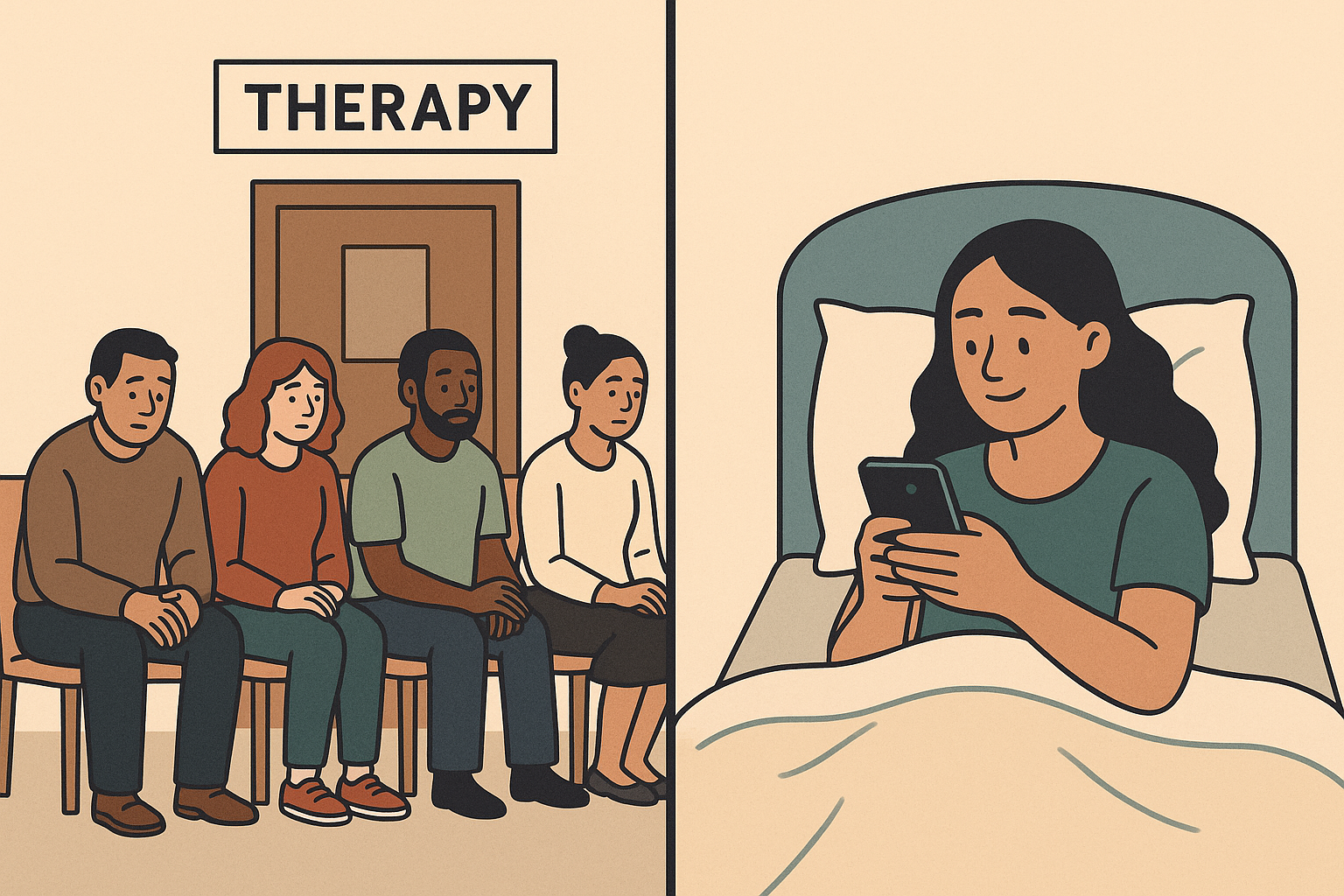
The truth is: traditional therapy can be life-changing but it’s not the only path to healing. That’s why digital tools like AI therapy are becoming essential alternatives, meeting people where they are and removing many of these barriers.
Up next: how AI therapy works and why more people are opening up emotionally to chatbots than ever before.
How AI Therapy Like Aitherapy Helps You Open Up Emotionally
One of the biggest benefits of AI therapy is that it removes many of the barriers that stop people from expressing their emotions. Whether it’s fear of judgment, cost, or lack of time, AI tools like Aitherapy create a safe, low-pressure space to talk even if it’s just typing into a chatbot.
1. Private and Judgment-Free
With Aitherapy, there’s no fear of being misunderstood or judged. You can say anything, messy, angry, confused, or scared and get a calm, thoughtful response trained in evidence-based methods like CBT (Cognitive Behavioral Therapy).
🧠 Users often report that it’s easier to open up to AI than to a human therapist especially when talking about shame, grief, or fear.
2. Available Anytime, Anywhere
Whether it’s 2 p.m. between meetings or 3 a.m. during a spiral, Aitherapy is there. No appointments, no waiting. Just open the app and start talking.
3. Easy to Start, Easy to Stop
You don’t need to commit to a full session or know exactly what to say. You can start with a single sentence, check in for a few minutes, or write out everything on your mind. The experience is fully on your terms.
4. Designed with Emotional Intelligence
Unlike generic chatbots, Aitherapy is trained with real therapeutic conversations. It knows how to gently guide you toward helpful insights, challenge unhelpful thoughts, and reflect emotions back to you in a caring, validating way.
5. Built on Proven Techniques
Every message you exchange with Aitherapy draws from proven psychological methods, including CBT, mindfulness, and emotional regulation strategies.
AI therapy is quickly becoming a powerful first step for people who don’t know how or where to begin opening up.
Can AI Therapy Really Improve Mental Health?
Skeptical about whether a chatbot can really support mental health? That’s fair and researchers have asked the same question. But the data is becoming clear: AI-powered therapy tools can help people feel better, faster, and more supported than many expect.
Study: AI Therapy Reduces Depression Symptoms by 51%
A study from Dartmouth College on an AI therapy chatbot called Therabot found a 51% reduction in depressive symptoms among users after consistent interaction over several weeks. Participants reported feeling more comfortable opening up to AI than to a person, especially in the early stages of emotional healing.
Source
✅ AI Tools Are Especially Effective for:
- People new to therapy or unsure where to start
- Those with mild to moderate anxiety or depression
- Individuals who fear stigma or judgment
- People who want affordable, consistent emotional support
Of course, AI isn’t a full replacement for human therapists especially in cases of trauma, severe mental illness, or suicidal thoughts. But for everyday emotional struggles, AI can be an empowering companion on the path to healing.
How to Start Expressing Your Emotions in a Healthy Way
If you’ve spent years bottling emotions, the idea of finally expressing them can feel… awkward. Or scary. Or impossible.
The good news? You don’t need to be perfect, poetic, or even totally clear. The most important thing is simply to start.Here are some beginner-friendly ways to ease into healthy emotional expression, no therapist required.
1. Journal Without Judgment
Write freely for 5–10 minutes about how you’re feeling. Don’t worry about grammar or structure. Just let your thoughts out. Use prompts like:
- “Right now, I feel…”
- “The thing I’m avoiding is…”
- “I wish someone knew…”
2. Try Aitherapy’s AI Emotional Check-In
Start with just a sentence. Aitherapy will guide you gently, using CBT-based methods to help you name emotions, reframe thoughts, and feel heard without pressure or judgment.
🔗 Try a free emotional check-in with Aitherapy →
3. Record a Voice Note to Yourself
Speaking your feelings out loud just to yourself can be powerful. Use your phone to record a message about your day, your stress, or something unresolved. Listen back later or delete it. Either way, it’s progress.
4. Use Movement or Art to Express What You Can’t Say
If words don’t come easily, express through music, drawing, dancing, or movement. Emotion is energy. Let it move through you.
5. Practice One Honest Sentence a Day
Start small: Tell someone, “I’m having a tough day,” or “I felt overlooked earlier.” Even just one emotionally honest sentence builds emotional strength over time.
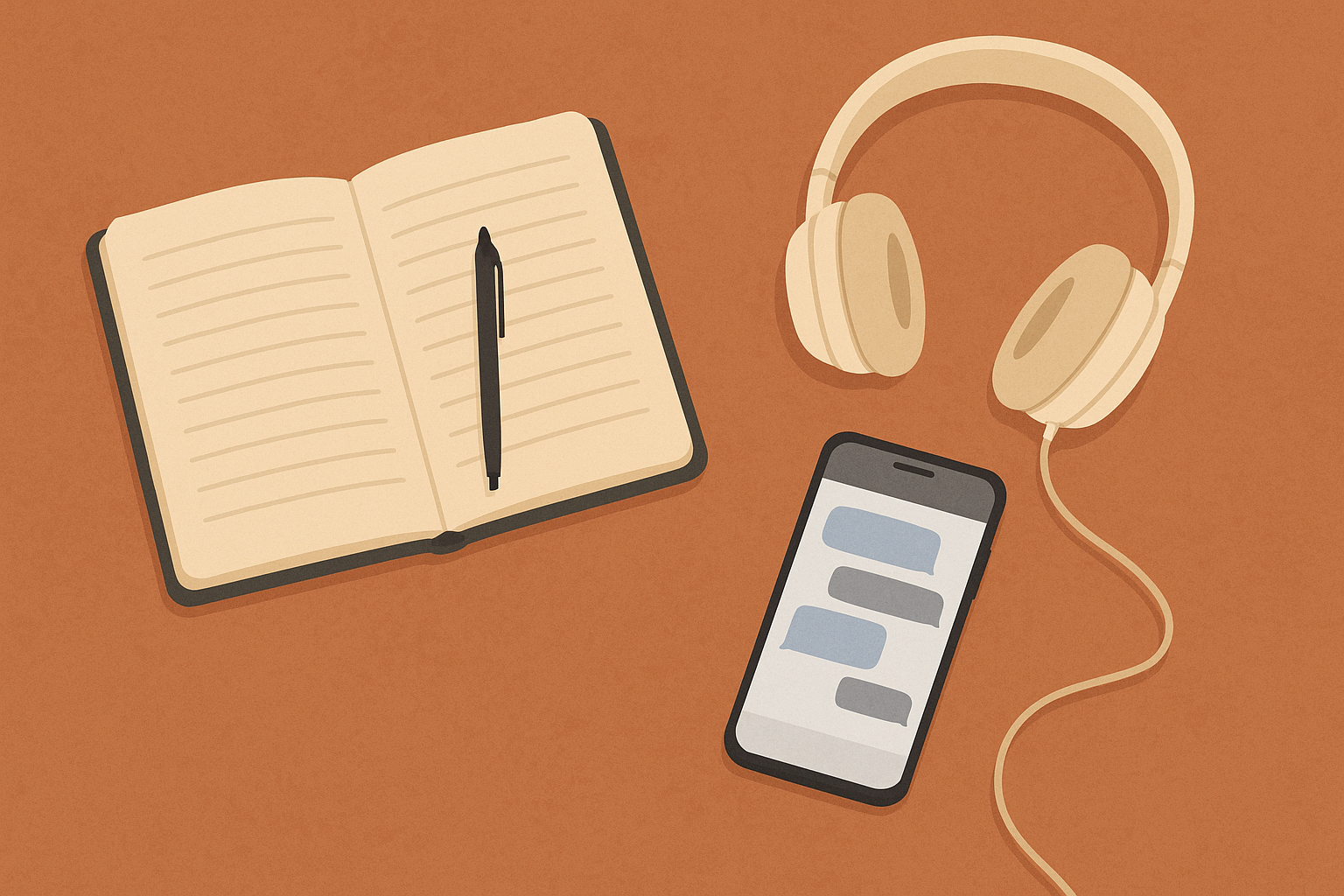
You don’t have to go from bottling everything to spilling it all overnight. Expression is a muscle and AI therapy can be your emotional warm-up.
Try AI Therapy for Free Today
You don’t need to wait for a crisis to start taking care of your emotional well-being.
If you’ve been bottling your feelings, avoiding hard conversations, or struggling to name what you’re going through you deserve a space to express yourself safely, consistently, and without judgment.
Aitherapy gives you that space.
✅ 20 free AI messages every day
✅ 24/7 access, no appointments
✅ CBT-based support trained by real therapists
✅ Mobile app for anytime, anywhere conversations
✅ Absolute privacy and HIPAA-aligned design
Your feelings deserve to be heard.





